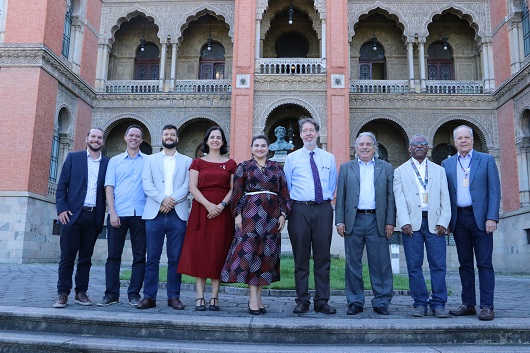American consulate delegation discusses program of exchange on a visit to Fiocruz
03/02/2023
Cristina Azevedo (Fiocruz News Agency)
An idea that emerged during the visit of the United States Consul General in Rio de Janeiro, Jacqueline Ward, to Fiocruz in 2021, took shape and will come to fruition this year. The participation of three researchers from the Foundation in the International Visitor Leadership Program (IVLP), an exchange initiative funded by the U.S. State Department, was one of the topics at the meeting with a new delegation from the U.S. diplomatic representation last Friday, January 28. In this meeting, in the room of the Fiocruz Global Health Center (CRIS), Fiocruz's actions to fight the COVID-19 pandemic were also discussed, as well as a possible collaboration between Fiocruz's libraries and that of the US Congress, and new areas of partnership with scientific and educational institutions in the country.
The American delegation was welcomed by Cristiani Machado (photo: Peter Ilicciev)
Sofia M Khilji, Chief Consul of the Department of Politics and Economics, Marco S. Sotelino, Consul for Economic Affairs, and Paul Losch, Director of the Library of Congress, brought updates on the IVLP. In the case of this year's program, the theme chosen was Promoting Bilateral Collaboration in Health Science, prepared especially for a group of ten Brazilians, of which three will be from Fiocruz. From April 10 to 18, the members will visit institutions such as the Centers for Disease Control and Prevention (CDC, an agency of the Department of Health and Human Services), and the National Institutes of Health (NIH), as well as universities and health technology companies.
The meeting, however, went beyond the IVLP. The delegation was welcomed by Cristiani Vieira Machado, Vice President of Education, Information and Communication (VPEIC), who gave an overview of Fiocruz's performance in the Brazilian territory, highlighting the distance learning courses quickly established to train health professionals to deal with the new coronavirus. Rodrigo Correa de Oliveira, vice president of Research and Biological Collections (VPPCB), talked about the legacy of the actions against COVID-19, such as the establishment of the Genomics Network, the Biobank, and the research with messenger RNA vaccine. Paulo Gadelha, the coordinator of Fiocruz Strategy for the 2030 Agenda (EFA 2030), told them not only about the G-Stic Rio, a global conference that aims to find solutions for sustainable development and will be held from February 13 to 15, but also about the Industrial Complex and Health.
Sofia Khilji recalled the long-standing collaboration between Fiocruz and American scientific institutions and highlighted what she had heard about sustainable technology. "It is very important that we do not lose what has been achieved during the pandemic, because other crises will come. This resilience and the responses to disasters, especially in relation to vulnerable communities, such as the Yanomami, are important, as is defending the natural resources of the Amazon and the Pantanal. These are areas where the partnership can increase with our epidemiological centers and the National Institutes of Health," she said.
Cristiani recalled the arrival of seven students from Princeton. "In return, we received two 'sandwich scholarships'. More proposals have already arrived. This is a type of exchange that could advance with other institutions."
The meeting was also attended by Pedro Burger, deputy coordinator of the Fiocruz Global Health Center (CRIS/ Fiocruz); Valber Frutuoso, advisor for Institutional Relations of the Presidency; and Vinicius Cotta de Almeida, deputy coordinator for International Education (CGE/VPEIC).



